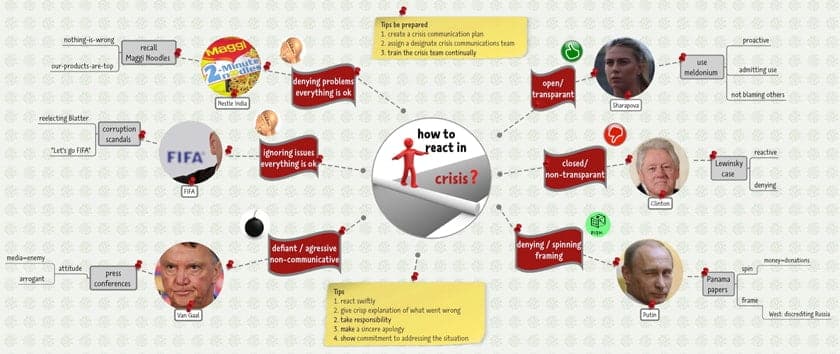The press meeting of Maria Sharapova is a textbook case of how to deal with a crisis. And many businesses can learn from her how to communicate in a crisis.
Rapid, proactive, factual, honest, and even with humor.
Sharapova (watch the video in the interactive mind map) tells the press that some thought she would announce her retirement.
“If I was retiring, it wouldn’t be in a downtown Los Angeles hotel with this ugly carpet.”
Compare her approach to how Lance Armstrong handled the allegations that he was using doping. Armstrong denied it for more than a decade before finally admitting it in an interview with Oprah Winfrey.
However, when asked if it felt wrong to cheat, Armstrong replied: “No. Scary.” The result of years of denying has been devastating for Armstrong. He lost all seven Tour de France titles and received a lifetime ban from competition.
In 2012, he resigned as chairman of the Lance Armstrong Foundation cancer charity which was renamed Livestrong. All of Armstrong’s sponsors have dropped him and in 2013 Nike cut ties with Livestrong.
In 2015 a Texas arbitration panel ruled that Armstrong must repay a Dallas-based sports promotions company $10 million in prize money he received for having won the Tour de France in 2002, 2003 and 2004.

*Watch the videos of all 7 cases within the interactive mind map: https://goo.gl/kQGJ8V.
Although denying is the old school way of handling a crisis, still, many companies, politicians, and managers fall back to this strategy.
Check the examples in the mind map. Nestle India initially denying that there were safety issues with its popular Maggi Noodles.
President Clinton denying that he had sex with intern Monica Lewinsky.
Iceland’s Prime Minister Gunnlaugsson walking out of a television interview when asked to explain his involvement in an offshore company.
Putin about the Panama Papers leak: “Well, regarding these offshore companies, your faithful servant is not there.
There is nothing to speak about.” PR week has a neat conclusion: “The savviest communicators have evolved from ‘deny’ to ‘accept the possibility’ to ‘be proactive’. Getting out in front of the story, let’s call this ‘the Sharapova Response’, means owning the narrative. Information flows from the source directly and unfiltered to the media.”
Well done Maria.
Recommended reading: http://www.inc.com/guides/how-to-communicate-in-a-crisis.html.
About the author
Hans Buskes is a business consultant, marketing communications manager, and mind mapper. He’s the author of several mind map books and mind map blogger on Mastermindmaps.



